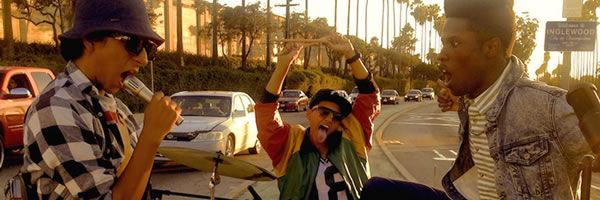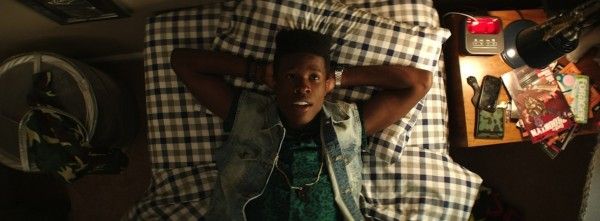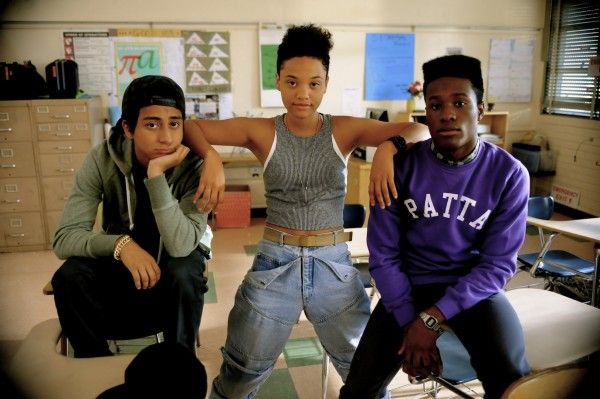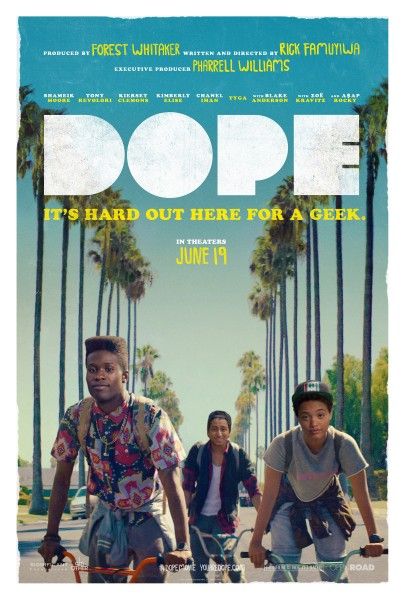[This is a re-post of my review from the 2015 Sundance Film Fesitval. Dope opens in theaters today.]
Allow me to preface this review by noting that I am in no position to critique the accuracy of the depiction of black culture in Rick Famuyiwa’s Dope. I may relate to the nerdy interests of his protagonists, but their circumstances and setting are largely foreign to me. However, I do feel confident in pointing out that while the movie has energy and thoughtful ideas, it’s also overstuffed, haphazard, and proceeds to spell out its overarching theme after it becomes a disappointing rehash of Risky Business. There are plenty of bright spots in Dope, but ultimately it’s all a bunch of flash.
Malcolm (Shameik Moore) and his friends Diggy (Kiersey Clemons) and Jib (Tony Revolori) are self-proclaimed nerds. They like 90s hip-hop culture, take their fashion cues from Yo! MTV Raps, have a rock band, and pursue “white” interests like “getting good grades” and “going to college.” (Those last two are verbatim from the film) When Malcolm develops a crush on Nakia (Zoë Kravitz), he follows her to a party only to accidentally get stuck with a backpack full of drugs. In order to keep himself, his friends, and his college hopes alive, Malcolm must sell the drugs while trying to stay true to his personality and avoid slipping into the negative stereotype of young, black men.
Dope is insightful and lively before it gets saddled with a plot. Malcolm’s life feels fresh, exciting, and unique, and Moore shows he’s an actor to watch. There are some predictable obstacles such as pursuing Nakia when she’s with Dom (Rakim Mayers), a dangerous, violent drug dealer. Malcolm is driven by libido, a desire to succeed academically, and wanting to hang out with his friends. As a character piece, Dope is charming even if it forgets its quirkier aspects like Malcolm’s obsession with 90s culture.
But once Dope decides to get a tired plot, the story becomes a mess as the plan to sell the drugs swallows up everything that would have fit more naturally into a looser structure. Malcolm’s desire to get with Nakia turns into an unnecessary romance subplot since she only exists to be his love interest. Spending time with a white hacker would be an amusing diversion, as the lead trio explains why he can’t use the n-word. But in film that’s now supposed to be driven by an urgent plot, it’s a waste of time. Famuyiwa can’t mesh the first-half’s personality with the second-half’s plot, and so Dope becomes crowded and distracted.
Even when the plot becomes a hindrance, it still supports a thoughtful subtext about racial identity and negative cultural expectations. Because Malcolm comes from a poor, primarily black neighborhood, he’s expected to be a criminal. And just by association with a criminal by going to Dom’s birthday party, Malcolm is completely swallowed up and forced to become a drug dealer. Even when the film is pulling apart at the seams, it still has something thoughtful to convey. And then Malcolm just proceeds to spell it out in the increasingly tired convention of the college application letter, which is the equivalent of “I learned something today…” (This plot point makes me retroactively dislike the way it’s used in The Spectacular Now and Me and Earl and the Dying Girl).
Even if it turns subtext into text, Dope will hopefully start a dialogue on black stereotypes, especially the depiction of black men in popular culture. As a middle-class white guy, I’m not sure how to participate in that conversation, but I’m glad that Dope can perhaps provide an entry point. The movie has plenty of say and a variety of ways to say it. There’s vibrancy, humor, and cleverness scattered throughout, and so while Dope certainly isn’t dumb, it’s also not as sharp as it could be.
Rating: C+




